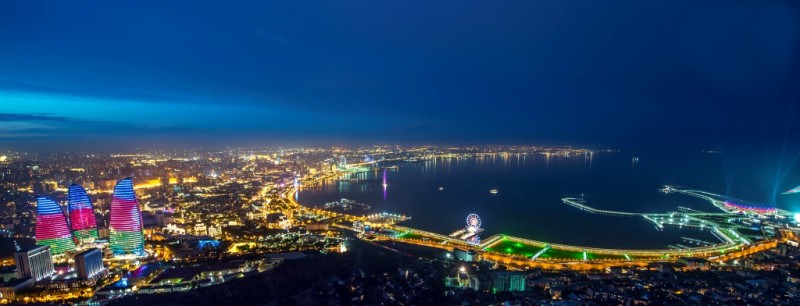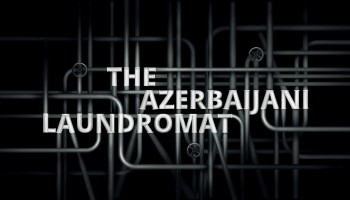The Azerbaijani Laundromat is the name given to a complex money-laundering operation that handled US$ 2.9 billion over a two-year period thanks to four shell companies registered in the United Kingdom.
Between 2012 and 2014, Azerbaijan’s kleptocratic ruling elites pumped the money through the companies’ Estonian bank accounts. The companies’ true owners were hidden behind unknown offshore shareholders. (See: Four Core Companies)
According to leaked banking records, the actions of the four companies were clearly coordinated. Hundreds of thousands of dollars would enter an account on a given day and be gone by evening, sometimes with just a few dollars remaining -- only for the operation to repeat on the next day.
The payments were sometimes repetitive. Occasionally, two or more of the companies would send the same amount of money to the same recipient on the same day. And there were other tell-tale signs of money laundering. Accounts on the other ends of both incoming and outgoing transactions belonged to an established constellation of offshore companies known to be involved in other money-laundering schemes.
Why go through all this trouble?
Money-laundering operations like the Laundromat are common in the former Soviet republics and are often deeply integrated into their economies. They may be used by government officials, organized crime groups, or even ordinary businesses for purposes such as disguising the origins of money, evading taxes or sanctions, paying bribes, bypassing customs fees, moving funds to Europe or other markets, or embezzling funds.
The Azerbaijani operation, too, was likely designed primarily to obscure the origin and destination of dirty money. It was also used as a slush fund to pay off people (both inside and outside the country) who served the interests of the political elite in Baku; to buy luxury goods; or to move money abroad for various purposes.
Azerbaijan is run by the family of President Ilham Aliyev, which controls a huge portion of the country’s wealth. The Aliyevs have shamelessly plundered the state like it was their personal ATM machine. They control at least eight banks, numerous luxury hotels, construction companies, and other major assets. The true extent of their control of the oil-rich state’s economy is unknown.
As in other captured states, the family core is surrounded by a group of wealthy businessmen and political elites -- often related by marriage or business ties -- who control the next level of the economy and most ministries. Their fortunes rise and fall depending on the Aliyevs’ favor.
Many of these people appear in the Laundromat records. Some own import companies, and used the Laundromat to evade customs fees and taxes.
A sampling of the Azerbaijani Laundromat’s users shows the varied and creative uses to which the system was put. One Azerbaijani businessman told OCCRP the system helped him avoid paying bribes to customs officers for merchandise he was importing from abroad.
Yaqub Eyyubov, one of the country’s most powerful politicians, got millions of dollars through the system in the accounts of a company his family controlled in Hungary -- and also used it to pay his family’s medical expenses. Others used millions to purchase football clubs, high-end travel agencies, and luxury cars. Significant amounts were funneled to prominent Europeans who then worked to improve Azerbaijan’s image abroad -- a priority for the country’s authoritarian rulers. (See: The Influence Machine)
This Laundromat involves offshore companies that appear in these corrupt deals as business partners, customers, consultants, investors, suppliers or other seemingly legitimate participants, often generating a convincing paper trail to explain transactions.
The Azerbaijani Laundromat is part of a larger worldwide network that operates almost like a shadow banking system.
Reporters for OCCRP previously exposed the Russian Laundromat, a fraudulent scheme that moved more than $20 billion out of the Russian Federation, and other, smaller, laundromats operating in Ukraine. The two laundromats are connected. Some 33 companies in the Azerbaijani Laundromat also appear in the Russian version.
All of these set-ups share the same formation agents -- the people who draw up the paperwork and may appear to control a company, but actually are acting for a hidden owner.
They use the same type of British-based limited partnerships. In some cases, they share companies and bank accounts between them. Metastar, one of the companies at the core of the Azerbaijani Laundromat, was used in the Russian Laundromat as well.
Many of the laundromats allow multiple participants to commingle funds to further obscure their operations. One of the first operations of this type uncovered by OCCRP, the Proxy Platform, was simultaneously used by Mexico’s Sinaloa drug cartel, Vietnamese criminal groups, Russian state companies and Russian organized crime.
Experts believe there are $2 trillion in global illicit flows that must be laundered each year. Laundromats like this one are likely springing up all the time in every major developing economy. Setting up and servicing these financial fraud vehicles is itself a billion-dollar business. And national law enforcement doesn’t have the tools to unmask these global schemes. It looks like Laundromats are here to stay.
This story is part of the Global Anti-Corruption Consortium, a collaboration started by OCCRP and Transparency International. For more information, click here.




